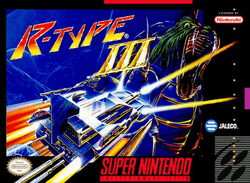R-Type III: The Third Lightning
| R-Type III: The Third Lightning | |
|---|---|
 North American Super NES cover art | |
| Developer(s) |
Irem Raylight Studios (GBA) |
| Publisher(s) |
|
| Composer(s) | Ikuko Mimori |
| Platform(s) | Super Famicom/SNES, Game Boy Advance, Wii (Virtual Console) |
| Release date(s) |
Super Famicom/SNES Game Boy Advance Wii Virtual Console |
| Genre(s) | Horizontal scrolling shooter |
| Mode(s) | Single-player |
R-Type III: The Third Lightning (アールタイプ・スリー ザ・サード・ライトニング Āru Taipu Surī: Za Sādo Raitoningu) is a 1993 horizontally scrolling shooter video game developed by Irem.
Description
R-Type III was originally released only on the Super Famicom/SNES, but later ported to the Game Boy Advance. It was the first game in the series to introduce new Forces. As well as the original Force (which was now named the Round Force, later named as the Standard Force in R-Type Delta), the player could choose from two other Forces: the Shadow Force and the Cyclone Force. These both had new, different weapon sets and special enhancements.
It also refined the weapons and charging system. It reverted to the original Red-Blue-Yellow weapon system, and the Diffusion Wave Cannon from R-Type II was replaced with a more standard wave cannon. Charging this cannon to full beam strength results in a massive, powerful beam that passes through all enemies and obstacles. A new weapon called the Hyper Wave Cannon was also added to the ship, which the player could use instead of the normal wave cannon if desired. By switching to Hyper mode and supercharging the wave cannon, the ship temporarily gains the ability to use the Hyper Wave Cannon, which is unique among wave cannons in having a rapid fire capability. The shots fired create damaging explosions, and if the player has collected one or two Bits, they spin around the ship burning with energy. However, this Hyper mode causes the ship to overheat after a short while, and it must subsequently spend seconds cooling down, during which time the wave cannon is inoperative.
The fighter in R-Type III is identified in R-Type Final as the R-9Ø Ragnarök; it was originally referred to as 'R-90'. In fact, the original R-90 has been split into three in Final: the R-9S Strike Bomber has the R-90's basic Standard force unit and first wave cannon, identified as Mega Wave Cannon. Final's version of the R-90 has the Shadow Force and Hyper Wave Cannon, but is unable to choose its Force or switch between Wave Cannons. Finally, the R-9Ø2 Ragnarok II has the R-90's final Force, the Cyclone Force, and the Giga Wave Cannon, which can be charged through 7 loops. It can be assumed that this is because the original R-90 would simply be too powerful for the game to be any kind of challenge.
The Super Famicom/SNES version was released for download on the Nintendo Wii's Virtual Console, but was delisted in Japan on March 30, 2012, Europe on March 31, 2012 and North America on January 2, 2013.
Versions
A notable difference between the Japanese and Western versions is the stage boss at the end of level 2: in the Japanese version the player is attacked at this point by large sperm-like swimming creatures, whereas the other versions replaces these with swimming eyeballs that still retain their sperm-like shape.
Reception
Electronic Gaming Monthly's reviewers gave the Super NES version a unanimous score of 8 out of 10, commenting that "Huge levels, excellent bosses (and a rather high difficulty) makes this the shooter to get." They also praised the inclusion of a two-player mode.[2] R-Type III: The Third Lightning was awarded Best Shooter of 1994 by Electronic Gaming Monthly.[3]
External links
References
- ↑ Group, SPCDumpers. "Game profile: R-Type III: The Third Lightning ~ SNESmusic.org". snesmusic.org. Retrieved 2016-12-04.
- ↑ "Review Crew: R-Type III". Electronic Gaming Monthly (62). EGM Media, LLC. September 1994. p. 32.
- ↑ "Electronic Gaming Monthly's Buyer's Guide". 1995.